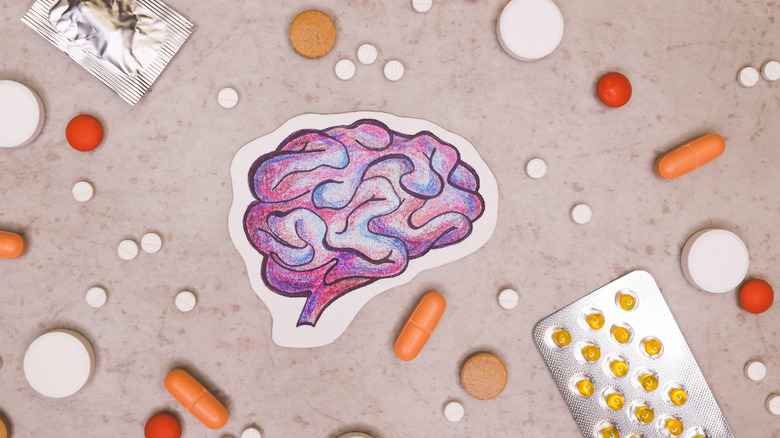What Are The Most Common Prescribed Antidepressants?
For some people, psychotherapy on its own may not be enough to treat their depression. In certain cases, some individuals may benefit from taking antidepressants as an additional method of treatment. Antidepressants alter the chemistry of the brain as they work with chemicals called neurotransmitters, according to Healthline. Because of their effects on neurotransmitters, antidepressants can be prescribed to treat a variety of mental health conditions, like major depressive disorder, obsessive-compulsive disorder, social anxiety disorder, generalized anxiety disorder, and post-traumatic stress disorder.
Some people who take antidepressants experience side effects, especially during the beginning of treatment. As explained by the Mayo Clinic, some individuals may experience nausea, increased appetite, fatigue, dizziness, insomnia, or sexual side effects. When compared to other antidepressants, some antidepressants are more likely to lead to weight gain. If you're considering taking an antidepressant, you can speak with your doctor about whether weight gain is a common side effect. In more severe and rare cases, taking antidepressants could increase the risk of self-harming thoughts, as reported in a 2018 article published in the International Journal of Neuropsychopharmacology.
It's up to an individual whether the potential benefits of taking an antidepressant outweigh the possible side effects, and it's important to discuss the pros and cons of taking them with your doctor. In addition, some doctors will prescribe certain classes of antidepressants more often than others.
Antidepressants that are prescribed the most
You may have heard of some of the most commonly prescribed antidepressants, such as Prozac, Lexapro, or Zoloft. The Mayo Clinic explains how these medications fall under the antidepressant category of SSRIs, or selective serotonin reuptake inhibitors. Many health professionals prefer to prescribe SSRIs because they are associated with fewer side effects and less chance of severe overdose, according to the National Health Service (NHS). The Cleveland Clinic reports that serotonin acts as a mood stabilizer and emotion regulator, which is why it's referred to as the "feel good" chemical.
Neuroscientific research has discovered that lower levels of serotonin can be associated with higher levels of depression. By blocking serotonin's reuptake into neurons, SSRIs are believed to increase the amount of serotonin available in the brain, therefore enhancing the chemical communication between neurons (per Mayo Clinic).
The efficacy of SSRIs is still debated in the scientific field of psychiatric research. A 2017 article published in JAMA Psychiatry found that most children and adolescents who took SSRIs noticed significant benefits when compared to the participants who received placebos. The positive result was particularly evident for the participants who had anxiety disorders. Additionally, a 2017 meta-analysis published in BMC Psychiatry discovered that the depression symptoms of the participants appeared to decrease when taking SSRIs compared to placebo, although they acknowledge the limitations of their analysis. Additionally, their study's results suggested a high probability of both serious and non-serious adverse affects for the participants taking SSRIs.
Less commonly prescribed antidepressants
Although SSRIs are the most commonly prescribed antidepressants, other types are available. SNRIs, or serotonin and norepinephrine reuptake inhibitors, are another class of antidepressant that are relatively popular. Three common examples of FDA-approved SNRIs are Pristiq, Cymbalta, and Effexor, according to GoodRX Health. The difference between SNRIs and SSRIs is that SNRIs increase the level of the hormone norepinephrine in addition to serotonin. According to the Cleveland Clinic, norepinephrine is associated with the acute stress response or the "fight or flight" response, and is created from the neurotransmitter dopamine. In addition, norepinephrine has effects on mood, arousal, attention, sleep, and memory.
Less commonly prescribed antidepressants are under the classes of noradrenaline and specific serotonergic antidepressants (NASSAs), tricyclic antidepressants (TCAs), serotonin antagonists and reuptake inhibitors (SARIs), and monoamine oxidase inhibitors (MAOIs), as reported by the National Health Service (NHS). NASSAs are sometimes prescribed to individuals who can't take SSRIs, and are associated with less severe sexual side effects when compared to SSRIs. Trazodone is the most commonly prescribed SARI, and can be prescribed off-label to treat insomnia and anxiety (per American Addiction Centers).
TCAs and MAOIs are older forms of antidepressants, and are less likely to be prescribed as the first choice to treat depression, as they can have more severe side effects than SSRIs and SNRIs (per NHS).
If you're interested in beginning treatment with an antidepressant, a psychiatrist or doctor can help you figure out which class of antidepressants would work best for you.



